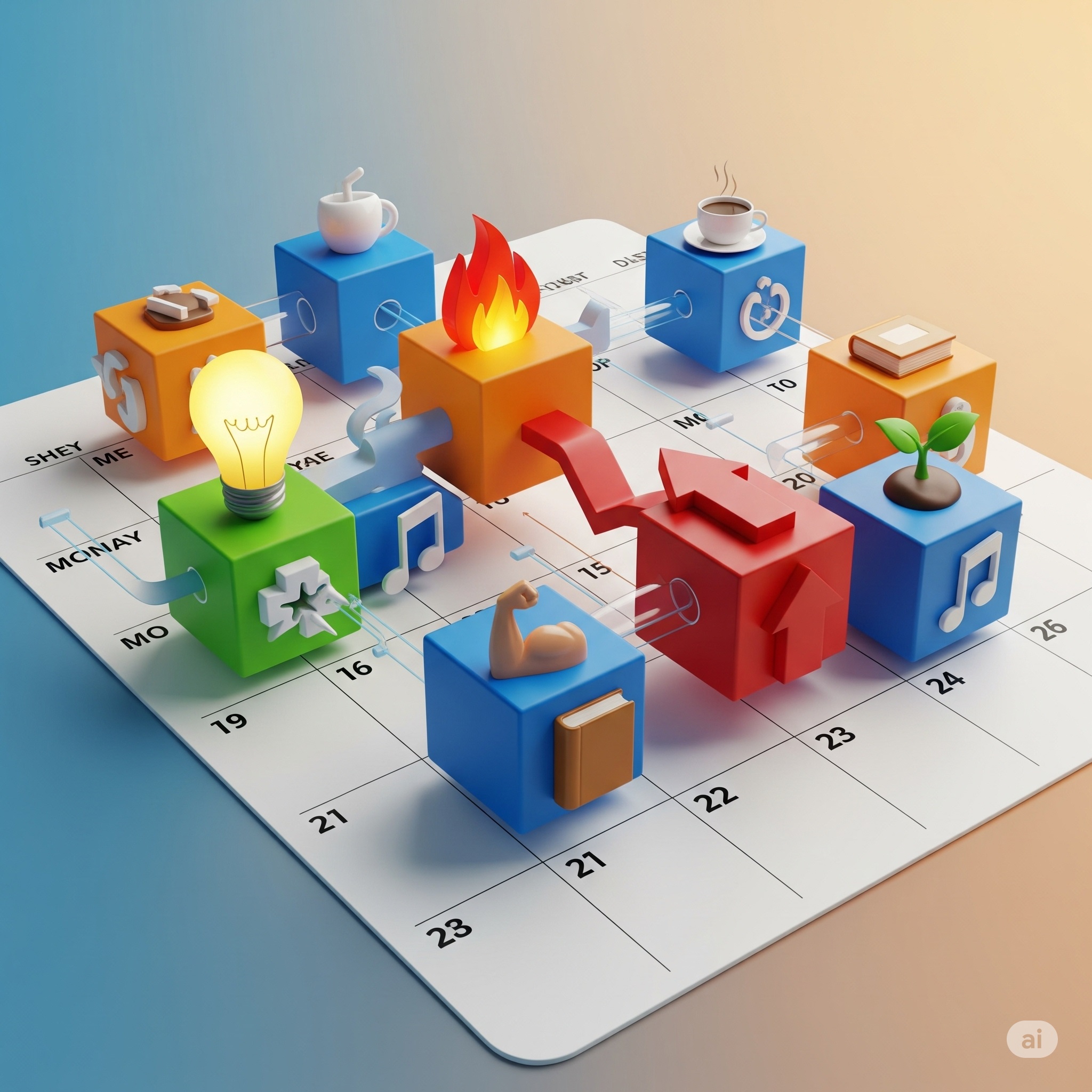
Write what you are looking for and press enter to begin your search!

Introduction
If you're reading this, you've likely made a bold choice: ditching the traditional university route to build your career through self-learning. You're tired of hearing about "finding your passion" and "waiting for inspiration to strike." This article will show you exactly why scheduling is the most underrated superpower in self-learning, how mystical thinking about motivation can sabotage your progress, and the specific ways that syncing your drive to your calendar creates unstoppable momentum toward landing that graduate-level position without the graduate debt.
Why Scheduling Is Your Self-Learning Catalyst
Here's the uncomfortable truth that most self-learning gurus won't tell you: motivation is not a renewable resource you can mine whenever you need it. It's more like a muscle that strengthens with consistent use and atrophies with neglect. Scheduling doesn't just organize your time, it literally rewires your brain's relationship with learning.
When you schedule your learning sessions, you're creating what psychologists call "implementation intentions." Instead of vague promises like "I'll learn Python this week," you're making specific commitments: "I'll code for 90 minutes every Tuesday and Thursday from 7-8:30 PM." This specificity triggers a neurological shift. Your brain stops treating learning as an optional activity and starts treating it as an inevitable one.
The scheduling effect goes deeper than simple time management. It creates psychological momentum through what researchers call the "Zeigarnik Effect"—our brains are wired to remember incomplete tasks better than completed ones. When you schedule learning sessions, you're essentially creating productive tension in your mind. That Tuesday coding session isn't just an appointment; it's an unfinished story your brain is compelled to complete.
Consider this: every successful professional you admire didn't stumble into expertise by accident. They created systems that made progress inevitable rather than hopeful. Your calendar becomes your competitive advantage because while your university-bound peers are attending lectures they may or may not find engaging, you're building precisely the skills employers actually need, on a schedule that compounds daily.

The Mystical Motivation Trap: Why "Following Your Passion" Can Derail Your Career
The self-help industry has sold an entire generation on the myth of mystical motivation, the idea that successful learning happens when you "feel inspired" or when you've "found your true calling." This thinking isn't just wrong; it's professionally dangerous for self-learners.
Here's why mystical motivation fails spectacularly in real-world career building: employers don't care about your passion journey. They care about your ability to deliver results consistently, meet deadlines, and solve problems even when you don't feel like it. When you condition your learning on feeling motivated, you're training yourself to be unreliable, the exact opposite of what hiring managers seek.
The mystical approach also creates what I call "passion paralysis." Self-learners get trapped endlessly searching for the perfect field, the ideal project, or the most inspiring curriculum. Meanwhile, their peers who simply picked a direction and started building skills systematically are landing interviews and job offers.
Think about it this way: a plumber doesn't wait to feel passionate about fixing pipes before showing up to work. A successful data analyst doesn't postpone learning SQL until they feel spiritually connected to databases. Professional success comes from developing competence through consistent practice, regardless of your emotional state on any given day.
The most insidious aspect of mystical motivation is how it makes you dependent on external circumstances for internal drive. When you rely on feeling inspired, you're essentially outsourcing your career development to random emotional fluctuations. That's not a strategy; it's wishful thinking disguised as personal development.
Strategic Calendar Syncing: When and Where to Lock In Your Learning Drive
The magic happens when you stop treating your learning schedule as suggestions and start treating them as non-negotiable appointments with your future career. But timing and environment matter enormously for sustainable progress.
Prime Time Scheduling: Your brain has natural energy cycles, and fighting them is futile. Most people experience peak cognitive performance either early morning (6-9 AM) or late evening (7-10 PM). Schedule your most challenging learning during these windows. Use lower-energy periods for review, practice problems, or watching educational content.
The Weekend Intensive Strategy: While daily consistency matters, weekend intensive sessions create breakthrough moments. Block 3-4 hour weekend chunks for deep project work. This is where you'll build portfolio pieces that actually impress employers, not the 30-minute daily sessions that barely scratch the surface.
Environmental Triggers: Your physical space should reinforce your learning identity. Whether it's a specific coffee shop, a dedicated home office corner, or a library carrel, consistency in location creates automatic behavioral cues. Your brain learns to shift into learning mode simply by being in that environment.
The Calendar Defense System: Treat your learning blocks like client meetings, because they are meetings with your future self. Turn off notifications, set your status to "busy," and protect these sessions as fiercely as you would any professional commitment. When friends suggest spontaneous plans during your scheduled learning time, you already have an answer: "I have a prior commitment."
Integration Opportunities: Look for dead time in your existing schedule. Commute time becomes podcast learning time. Lunch breaks become skill practice sessions. The goal isn't to fill every moment with learning, but to identify existing time blocks that can serve double duty.

Daily Scheduling: The Motivation Multiplication Effect
Daily scheduling doesn't just organize your learning, it transforms your entire relationship with professional development. Here's how consistent scheduling creates compounding motivational returns:
Progress Visualization: When learning sessions are scheduled, you can track completion like a professional project. Seeing a calendar filled with completed learning sessions provides concrete evidence of your commitment. This visual proof builds confidence and reinforces your identity as someone who follows through.
Micro-Momentum Building: Each completed scheduled session creates psychological momentum for the next one. You're not starting from scratch each day; you're continuing an established pattern. This eliminates the daily decision fatigue of "Should I learn today?" The answer is already decided.
Skill Compound Interest: Consistent daily scheduling allows skills to build on each other systematically. When you learn JavaScript functions on Monday and practice them Tuesday, then apply them to a project Wednesday, you're creating educational compound interest. Random learning sessions can't achieve this cumulative effect.
Professional Habit Formation: Employers value reliability above almost everything else. When you demonstrate the ability to maintain consistent learning schedules, you're proving you can handle consistent work schedules. This self-discipline becomes a competitive advantage in interviews and job performance.
Energy Management Optimization: Scheduled learning sessions help you identify your natural productivity patterns. You'll discover whether you learn better with short daily bursts or longer concentrated sessions. This self-knowledge allows you to optimize your approach for maximum retention and application.
Deadline Simulation: Real jobs have deadlines, not suggestions. When you schedule learning goals with specific completion dates, you're simulating workplace pressure in a controlled environment. This prepares you for the reality of professional expectations better than any classroom experience.
Network Effect Amplification: Consistent scheduling makes you a reliable learning partner. Whether it's online study groups, coding meetups, or professional development workshops, people notice and remember those who show up consistently. This reliability opens doors to mentorship and job opportunities.
Confidence Through Competence: Perhaps most importantly, daily scheduling builds genuine confidence through demonstrated competence. You're not hoping you're qualified for that entry-level position, you have concrete evidence of consistent skill development that employers can verify through your portfolio and work samples.
Conclusion: Your Scheduled Path to Professional Success
The path from self-learner to hired professional isn't mysterious, it's methodical. This article has shown you why scheduling transforms learning from a hobby into a career-building system, how mystical motivation thinking can sabotage your progress, the strategic approaches to calendar syncing that maximize your natural energy and focus, and the specific ways daily scheduling creates motivation momentum that compounds over time.
Key Takeaways for Your Self-Learning Success:
1. Treat learning like a job before you have the job, schedule it, protect it, and show up regardless of how you feel
2. Abandon passion-seeking for skill-building, employers hire competence, not inspiration stories
3. Use your calendar as a professional development tool, block prime time for challenging material, weekends for intensive projects
4. Track completion to build confidence, visual proof of consistency becomes interview-worthy evidence of reliability
5. Design your environment to support your schedule, physical cues trigger mental shifts into learning mode
6. Schedule skill integration, not just skill acquisition, connect new learning to previous sessions for compound growth
The reality is simple: while others debate the value of self-learning versus traditional education, you can be busy building the skills, portfolio, and professional habits that get you hired. Your calendar isn't just a planning tool, it's your competitive advantage in a job market that values results over credentials.
Stop waiting for motivation to find you. Schedule it, sync your drive to your calendar, and watch your self-learning transform from good intentions into career-changing results.
chicken road play
Yes https://topolakd.net
0 Thumbs Up
0 Thumbs Down
Yes https://topolakd.net
rsrd\jzfdnzfd vbfdxb
swfewqfv sht n
Accountability is key to growth, and sharing your journey publicly adds a whole...